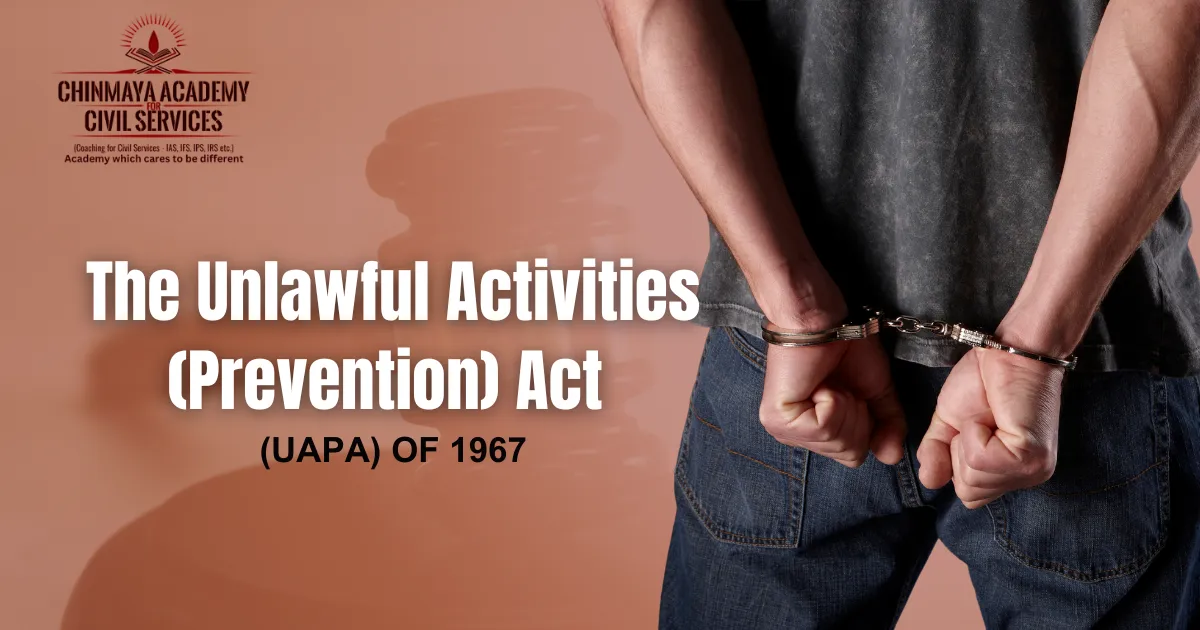
The Unlawful Activities (Prevention) Act (UAPA) of 1967 is an Indian law that aims to prevent unlawful activities of individuals and associations. The law was first enacted to deal with anti-national activities and secessionist movements. The law’s main objective is to provide powers to deal with activities that threaten the integrity and sovereignty of India.
Key points
- Enacted by: Parliament of India
- Citation: Act No. 37 of 1967
- Date of Enactment: July 5, 1967
- Objective: To prevent and combat unlawful activities, including terrorism, secessionism, and communal violence.
Key Provisions
- Designation of Unlawful Associations: The central government can designate any organization as a terrorist organization if it commits or participates in acts of terrorism, or prepares for or promotes such acts.
- Unlawful Activities: The Act defines various unlawful activities, including
- Advocating, abetting, or inciting secession of a part of India from the Union.
- Supporting any claim to the secession of any part of India from the Union.
- Disrupting the sovereignty and territorial integrity of India.
- Creating or inciting feelings of disaffection towards the Government of India.
- Participating in activities intended to disrupt or prevent the holding of any free and fair election.
- Promoting or engaging in activities that are prejudicial to the maintenance of harmony between religious, racial, linguistic, or regional groups or castes or communities.
- Powers of Arrest and Search: The Act empowers law enforcement agencies to arrest individuals without a warrant and to search premises without a warrant if there is reason to believe that an offense under the Act has been committed or is being planned.
- Punishment:
- Imprisonment:
- Life imprisonment: For certain serious offenses, such as promoting or engaging in activities intended to disrupt or prevent the holding of any free and fair election, or participating in activities intended to disrupt or prevent the unity and integrity of India.
- Imprisonment for a term which may extend to ten years: For offenses such as advocating, abetting, or inciting secession of a part of India from the Union.
- Imprisonment for a term which may extend to five years: For other offenses under the Act.
- Fine:
- In addition to imprisonment, the court may also impose a fine on the convicted person.
- Forfeiture of property:
- In certain cases, the court may also order the forfeiture of property that was used in the commission of the offense.
- Imprisonment:
Criticisms of the UAPA:
- The Act has been criticized for being too broad and vague, and for giving the government excessive powers.
- Critics argue that the Act is often used to target political opponents and dissenters, and that it has a chilling effect on freedom of expression.
- There have also been concerns about the due process rights of individuals accused under the Act, particularly the provision that allows for the detention of individuals without a warrant for up to 180 days.
Amendments to the UAPA:
The Unlawful Activities (Prevention) Act (UAPA) has undergone several amendments since its enactment in 1967. Here’s an overview of the major ones:
1. Unlawful Activities (Prevention) Amendment Act, 2004:
- Introduced the concept of “unlawful association” and empowered the government to ban such associations.
- Increased the maximum punishment for certain offences from 5 years to 10 years.
- Allowed to detain individuals suspected of being involved in terrorism for up to 180 days without a warrant.
2. Unlawful Activities (Prevention) Amendment Act, 2008:
- Expanded the definition of “terrorist act” to include acts that disrupt or damage public services or facilities.
- Made it an offence to knowingly provide support to a terrorist organization.
- Gave the National Investigation Agency (NIA) the power to investigate certain offences under the UAPA.
3. Unlawful Activities (Prevention) Amendment Act, 2012:
- Added a new provision that allows the government to designate individuals as terrorists.
- Made it an offence to advocate or support a secessionist movement.
- Increased the punishment for certain offences from 10 years to life imprisonment.
4. Unlawful Activities (Prevention) Amendment Act, 2019:
- Gave the government the power to designate individuals as terrorists without following a formal judicial process.
- Expanded the definition of “terrorist act” to include acts that cause fear or alarm to the public or a section of the public.
- Made it an offense to be a member of a terrorist organization, even if the individual has not committed any act of violence.
- Increased the maximum punishment for certain offenses from life imprisonment to death.
5. Unlawful Activities (Prevention) Amendment Act, 2022:
- Allowed the NIA to investigate cyber-terrorism cases.
- Gave the NIA the power to take over investigations from state police forces in certain cases.
- Removed the requirement for prior approval from the central government for the NIA to investigate certain offenses.
The UAPA is a controversial law, but it remains an important tool for the Indian government in its fight against terrorism and other unlawful activities.
Our other related articles.
 Chinmaya IAS Academy – Current Affairs Chinmaya IAS Academy – Current Affairs
Chinmaya IAS Academy – Current Affairs Chinmaya IAS Academy – Current Affairs
